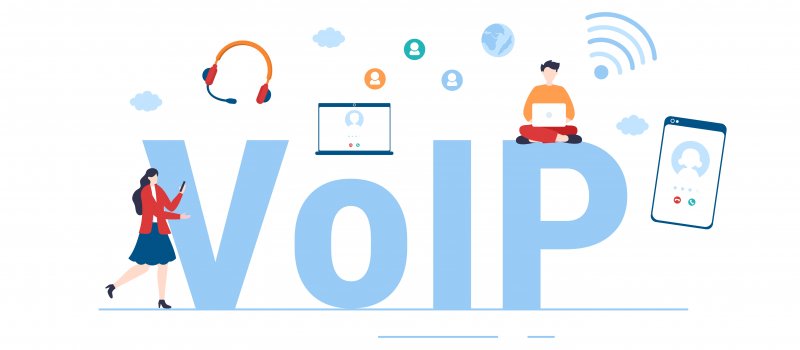As a business leader, you’re always seeking new tools and techniques for pushing your company forward. One outstanding resource you need to know about is Voice over Internet Protocol technology.
VoIP phone services have revolutionized telecommunications worldwide, and 31% of businesses are already users. Likewise, VoIP phones can take your organization’s connectivity to the next level with unparalleled flexibility and savings.
Exactly what is a VoIP phone system, and how does one work? Learn more about what this service can do for you.
Key Takeaways:
- A top VoIP phone provider allows you to conveniently handle your communications in one service through your existing internet connection.
- VoIP phone lines are superior to landlines in their security, reliability, and call quality.
- You gain multiple advantages with a VoIP telephone system, such as cost savings, flexibility, and integration with advanced productivity features.
- You don’t need to purchase additional equipment to set up a VoIP phone service, but you can invest in professional hardware if you want it.
What Is a VoIP Phone?
A simple VoIP definition is a communications technology that transmits calls over the internet instead of traditional copper phone lines.
Specific VoIP capabilities vary by devices and providers, but voice calls, text messaging, and one-on-one video calls are usually standard. You’ll need a Voice over IP phone to use the service.
VoIP Phone Definition
People generally refer to a VoIP phone as meaning any device that connects to the internet and uses the protocol for calls. These devices are able to compress multimedia information into data packets for online transfer. Your VoIP phone also decompresses such data to receive these transmissions.

How Do VoIP Phones Compare to Traditional Phone Systems?
Analog phone services rely on a physical line for connectivity. This type of connection restricts the user to a specific location.
Phones with VoIP capabilities connect through the internet, meaning you can use the service anywhere you can get online. Whether you’re using wired ethernet, Wi-Fi, or mobile data, your VoIP phone is available.
Consider the following ways a VoIP phone system compares to traditional phones:
| Feature | VoIP Phones | Traditional Phones |
| Voice calls | Yes | Yes |
| Video calling | Yes | Only with additional hardware and software |
| Call waiting | Yes | Yes |
| Caller ID | Yes | Yes |
| Easy installation | Always | Rarely possible |
| Wireless functionality | DECT, Bluetooth, and Wi-Fi capable | Only DECT and Bluetooth-capable |
| Technology | IP telephony through SIP, TLS, or SRTP | Analog copper wiring |
| Call quality | High-definition digital (Average 22 kHz at 16-bit resolution) | Terrestrial AM radio quality (Equal to 10kHz at 8-bit resolution) |
| Continuity capabilities | Automatic backup of data in secure centers and automatic routing to other online devices | Dropped calls or voicemail routing only |
| Cost to set up | Free unlimited lines | $100 per line (U.S. national average) |
| Activation fee | None | Yes |
| Auto attendant features | Standard | Requires setup of a private branch exchange |
| National long distance | Standard | Optional add-on for a fee |
| Business voicemail | Standard | Optional add-on for a fee |
| Call encryption | Yes | No |
| Remote/hybrid work compatible | Standard (through softphone apps) | Only with call forwarding add-on |
| Call routing | Standard | Optional add-on for a fee |
| Web fax | Yes | No |
| Business app integrations | Yes | No |
As you can see, VoIP phone services match or outperform landline phone systems in every critical category.
How Does a VoIP Phone Work?
Transmitting conversations in real-time involves much more than written messages or prerecorded media. Your professional VoIP phone system requires the highest levels of reliability, security, and efficiency.
A VoIP phone goes through the following process to establish a secure connection:
- You place a call from your device by dialing the number or selecting a contact, just like on a traditional phone.
- Your device first sends a registration request to your provider’s servers, which verifies your device’s credentials.
- The server then sets up and manages the connection between your device and the other party, encrypting and sending signals over the appropriate network.
- Once your conversation begins, your device converts your speech into compressed data packets and transmits them to your provider.
- Your provider conveys the data to the other provider, which forwards the data (or converts it to audio first if your listener is not on a VoIP phone).
Those may seem to be a lot of steps for a simple conversation. However, the state-of-the-art VoIP phone technology handles the whole process instantaneously, making it hardly different from a traditional phone call for users.
What Are the Transport Protocols for VoIP?
Business professionals have to concern themselves with security more than ever. Fortunately, when you work with a reputable provider such as Intermedia, your VoIP phone connections follow strict transport protocols to process and protect the conversation.
Transmission Control Protocol
TCP is one method devices use to communicate with each other over the internet. This protocol ensures the information traveling between two computers is accurate and arrives in the correct order.
TCP prioritizes adaptability and reliability to ensure message delivery, even when network resources are low or connectivity failures occur. Because of this, a small amount of distortion might happen, particularly when a user has low bandwidth. Still, the message is likely to get through.
User Datagram Protocol
UDP is a connectionless protocol that emphasizes speed over accuracy in transmission. For applications that don’t require ordered message delivery, UDP uses fewer system resources and does the job more quickly.
Fortunately, as a top provider Intermedia deploys both TCP and UDP to deliver the best possible type of connection at any given time.
What Are the Benefits of Using VoIP Phones?
A VoIP phone service offers more advantages than the plain old telephone system could ever dream of.

Easy Installation
You won’t wait on technicians or have to endure weeks of installation time. With a VoIP phone system, you can install or migrate from another provider with no downtime.
Advanced Voicemail
Not only do you have access to voicemail on your VoIP phone, but you also get additional features. For example, you can check your voicemail while online, get a transcription, or forward it to your email.
Scalability
Your company can increase or decrease lines effortlessly with easy-to-use controls in your administrative panel. If demand surges or dips, you can adjust the number of users and extra features accordingly.
Flexibility
An on-premise PBX phone system restricts your company to hiring onsite workers in one location. VoIP phone capabilities open the door to worldwide remote talent. You can also transfer calls to different devices while you’re on the go for optimal mobility.
Lower Costs
You only require a strong internet connection for high-definition VoIP calls, negating the need for expensive hardware or infrastructure. Plus, long-distance and international calling are a standard feature.
Security
What is VoIP phone security like? Your phone calls, video conferences, chats, and text messages all have high-level encryption. Protecting confidential data and meeting regulatory compliance becomes easier than ever with your VoIP phone service.
Simple Integrations
Unified communications with VoIP technology also make integration with productivity software seamless. You can easily use your workforce and customer relationship management software to monitor your team and improve performance.
What Type of VoIP Phone Is Best For Your Business?
VoIP phones come as either wired hardware or softphone apps. Determine which you’ll need for your company to be its most productive.
Types of VoIP Phones
One reason VoIP phone systems offer excellent cost savings is you can use a softphone on smart devices for calls. This app gives your equipment VoIP capabilities, so team members can use personal phones and tablets as VoIP cell phones anywhere they have the internet.
Also, you can easily have multiple numbers on a single device for professional communications. Because business calls run through the softphone app, conversations remain secure, and the company retains oversight of these interactions.
On the other hand, you can get plug-and-play hardware that connects to the internet as a tool exclusively for VoIP calls. These VoIP hard phones guarantee that workers have a high-quality device that works seamlessly with your service.
What are the VoIP phones that have the best features? Popular equipment includes:
- Unite X303W
- Polycom VVX 450
- Yealink T33G
- Yealink T57W
You can also obtain superior VoIP phone accessories and conferencing equipment. For example, the Yealink CP965 is an excellent choice if you need a device that offers a strong microphone and speaker for group calls.
VoIP Phone FAQs
Do I Need a VoIP Phone To Use VoIP?
If you already have an internet-enabled device (such as a smartphone, tablet, or PC), you don’t need to purchase additional hardware for VoIP functionality. A softphone app will provide you access to the services. Still, you can secure high-quality hard phone VoIP equipment.
How Much Does a VoIP Phone Cost?
Top-of-the-line VoIP phones with advanced features can cost hundreds of dollars. However, you can sometimes get a VoIP phone for free when you install a new business phone service. In any case, using a VoIP softphone app is always free with a top provider.
Is a VoIP Phone as Good as a Normal Phone?
A VoIP phone is better than a “normal” phone! VoIP phone services are less expensive, more secure, and of higher call quality than traditional phones.
Does a VoIP Phone Work Anywhere?
As long as you have a stable internet connection, you can use a VoIP phone. This flexibility allows companies to manage remote and hybrid teams worldwide.
Call Intermedia To Access the Full Benefits of a VoIP Phone System
Intermedia has been successfully helping companies make the best communications choices for decades. With our Worry-Free Experience, you can obtain the full flexibility, productivity, and cost savings of a VoIP system in no time.
Schedule a call with our team to discover how Intermedia Unite helps you work securely and productively from anywhere with a modern VoIP phone system!
September 8, 2023
Explore other posts on these topics: Moving to the Cloud Unified Communications





